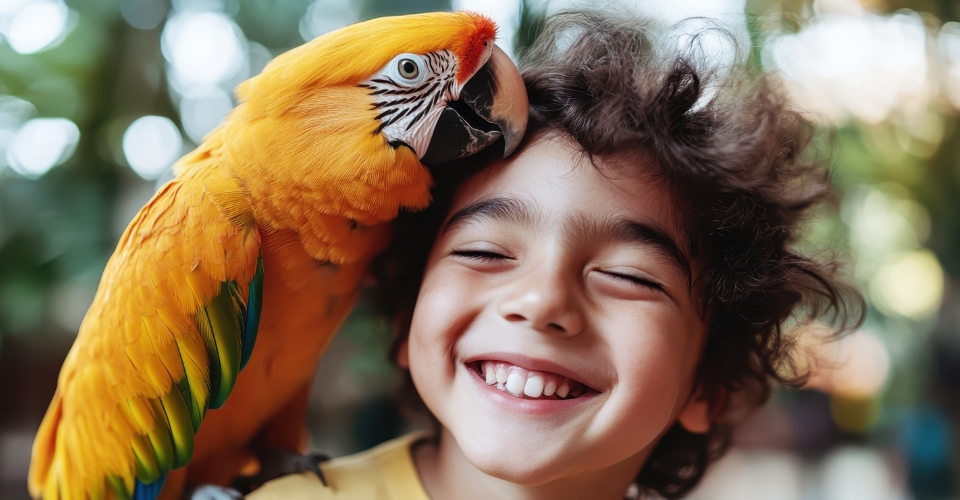Fun fact: Birds are masters at hiding illness. Looking sick makes them an easy target in the wild, so even pet birds instinctively mask their symptoms. Knowing the common bird diseases and their early warning signs is key to keeping your feathered friend healthy.
Here’s a breakdown of the most common bird diseases, how to spot them, and how you can protect your winged pets.
Common Signs of Illness in Pet Birds
If your bird isn’t acting like their usual chirpy self, watch for these signs of illness in birds:
- Fluffed-up feathers for long periods
- Lethargy or unusual quietness
- Changes in eating or drinking habits
- Runny nose or sneezing
- Laboured breathing or tail bobbing
- Unusual droppings (watery, discoloured, or fewer than usual)
- Weakness or difficulty perching.
Early detection can make a huge difference. So, a vet visit is always a good idea if something seems off.
Psittacosis (Parrot Fever) in Pet Birds
Psittacosis, also known as Parrot Fever, is one of the top contenders. It’s caused by a bacterium (Chlamydia psittaci) and can be transmitted to humans.
Symptoms in birds include:
- Greenish diarrhoea
- Eye or nasal discharge
- Ruffled feathers and weight loss
- Difficulty breathing.
Since humans can get psittacosis too, always wash your hands after handling your bird and keep their cage clean.
Aspergillosis: A Dangerous Fungal Infection
Aspergillosis is a serious fungal infection that affects the respiratory system in birds. It’s caused by mould, which is common in dirty cages, damp bedding, and old food.
Symptoms include:
- Difficulty breathing or wheezing
- Loss of voice
- Weakness and loss of appetite.
Prevention is simple: Keep your bird’s environment dry, fresh and clean.
RELATED: UNDERSTANDING ASPERGILLOSIS IN BIRDS: A VET'S PERSPECTIVE
More Common Pet Bird Diseases
Avian Polyomavirus
This viral disease primarily affects young birds, causing a loss of feathers, vomiting, and sudden death in severe cases. Unfortunately, there’s no cure, so prevention through hygiene and vaccination is very important.
Proventricular Dilatation Disease (PDD)
Sometimes called “Macaw Wasting Disease,” PDD affects the digestive and nervous systems, leading to weight loss, difficulty digesting food and neurological issues. While there’s no cure, early detection can help manage symptoms.
Additional Bird Illnesses to Watch For
Feather Plucking and Behavioural Issues
While feather plucking can be caused by stress or boredom, it can also indicate underlying health issues, such as infections, mites, or nutritional deficiencies.
Nutritional Deficiencies in Birds
A poor diet can lead to vitamin and mineral deficiencies, affecting feather quality, bone health, and immune function. Ensure your bird has a balanced diet with fresh fruits, vegetables, and high-quality pellets.
Can Humans Catch Bird Diseases?
Yes, some bird diseases, such as Psittacosis, can spread to humans. While rare, practising good hygiene when handling birds and cleaning their cages is essential. See a doctor if you develop flu-like symptoms after exposure to a sick bird.
How to Prevent Common Bird Diseases at Home
Prevention is always better than treatment! Here’s how to keep your feathered friend healthy:
- Provide a clean, dry, and well-ventilated living space
- Feed a balanced diet tailored to their species
- Schedule regular check-ups with an avian vet
- Quarantine new birds before introducing them to existing pets.
Protect Your Feathered Friend with Pet Insurance
Vet bills for exotic pets can be pricey but with dotsure.co.za’s Exotic Pet plans, you can get cover for some common bird diseases and illnesses, vet visits and more. Get a quote today and protect your bird with SA’s #1 pet insurance*.
*Voted South Africa’s Best Pet Insurance 2023/2024 by readers of various media publications.



